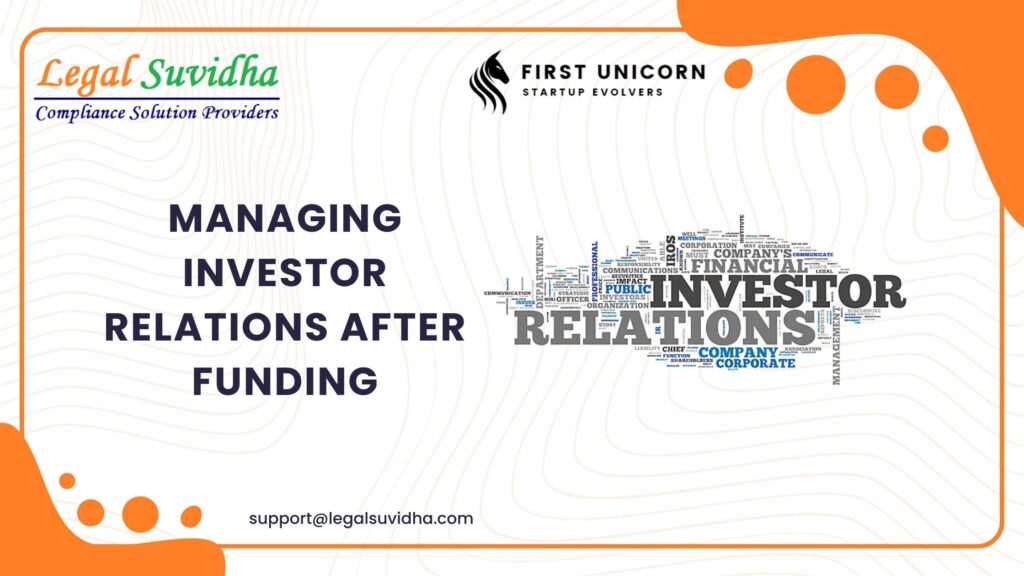Managing Investor Relations After Funding
Once a startup secures funding, whether through venture capital (VC), angel investment, or other forms of equity or debt financing, the next critical phase begins: managing investor relations (IR). Effective investor relations are crucial for sustaining investor confidence, ensuring smooth communication, and fostering long-term partnerships that benefit both the startup and its investors. Building and maintaining a strong relationship with investors can pave the way for future funding, guidance, and even exit opportunities.
This article will provide a detailed explanation of how to effectively manage investor relations after securing funding, including best practices, key strategies, and common mistakes to avoid.
What is Investor Relations (IR)?
Investor Relations refers to the practices and strategies used by startups and companies to communicate with their investors. The primary goal of IR is to keep investors informed about the company’s performance, growth prospects, strategic decisions, and financial health, while also building trust and transparency. For startups, it involves maintaining a consistent and open dialogue with investors about the business’s progress post-funding.
Why is Managing Investor Relations Important?
Effective management of investor relations is critical for several reasons:
- Trust and Confidence: Investors put their money into your startup, and they need to feel confident that their investment is in good hands. Keeping them informed helps build trust.
- Ongoing Support: Investors, particularly venture capitalists or angel investors, often bring expertise, networks, and valuable advice. By fostering a strong relationship, you can tap into their knowledge when needed.
- Future Funding: Positive relationships with investors can lead to additional funding rounds, follow-on investments, or introductions to new investors.
- Exit Opportunities: Investors are often involved in planning the exit strategy (such as an IPO or acquisition). Maintaining clear and transparent communication can influence successful outcomes.
- Long-Term Partnerships: Investor relations are not just transactional; they are about creating long-term, mutually beneficial relationships that can evolve as your startup grows.
Key Strategies for Managing Investor Relations
To successfully manage investor relations, startups must take several strategic steps to ensure clear communication, transparency, and trust-building. Here’s a breakdown of the most important strategies:
1. Regular and Transparent Communication
One of the cornerstones of effective investor relations is consistent and transparent communication. Investors need to feel informed about the progress of the startup and the key metrics that influence its growth.
Best Practices:
- Monthly/Quarterly Updates: Send investors regular updates on the company’s progress. These updates should include financial performance, key milestones, team developments, customer acquisition, market trends, and any challenges faced.
- Investor Reports: Create formal investor reports with key performance indicators (KPIs), revenue, profit/loss, burn rate, customer acquisition cost, etc. This gives investors a detailed picture of how the company is performing against goals.
- Communication Channels: Set up a structured communication system such as regular calls, emails, or virtual meetings. Some startups use investor dashboards or portals for real-time updates.
Benefits:
- Builds investor confidence by providing visibility into the startup’s performance.
- Keeps investors in the loop, enabling them to offer advice or assistance when necessary.
- Reduces the potential for misunderstandings or concerns arising from lack of information.
2. Setting Clear Expectations
From the beginning, it’s essential to set clear expectations with investors regarding:
- The business’s financial performance goals.
- The expected timeline for growth.
- The exit strategy.
- Any potential risks or challenges.
Clear expectations prevent misunderstandings and help investors understand what they can expect in terms of returns, timelines, and potential risks. By aligning expectations early on, both the startup and the investors will have a clearer understanding of what success looks like and what’s required to achieve it.
Best Practices:
- Establish clear milestones that investors can track.
- Be realistic about what the startup can achieve and the timeline required.
- Set transparent expectations regarding the potential risks, including financial or market risks.
3. Building Relationships Beyond Financials
While financial updates are vital, investors want more than just numbers. They also want to feel involved in the vision and strategy of the startup. Building personal relationships with investors can go a long way in strengthening the partnership.
Best Practices:
- Engage in strategic conversations: Involve investors in key decisions or discussions, particularly those involving scaling, product strategy, or pivoting.
- Seek advice: Investors often bring years of expertise. Ask for feedback on strategies or challenges and treat them as partners in decision-making.
- Celebrate milestones together: Share successes with your investors, and don’t hesitate to celebrate achievements (e.g., hitting revenue targets, product launches, new partnerships).
- Keep them involved in networking opportunities: If your investors are experienced industry professionals, ask for introductions to potential customers, partners, or advisors.
Benefits:
- Builds trust and deeper, more personal relationships with investors.
- Positions the startup as open to advice and mentorship, which is often valued by investors.
- Investors who feel personally involved are more likely to provide future funding or help during difficult times.
4. Be Honest About Challenges and Setbacks
It’s tempting to only share good news with investors, but keeping them in the dark about challenges can be detrimental. Investors appreciate transparency, and it’s important to communicate both successes and setbacks.
Best Practices:
- Acknowledge challenges: Be open about difficulties or roadblocks faced by the startup. Whether it’s operational issues, cash flow concerns, or regulatory hurdles, transparency is key.
- Share the plan: Don’t just talk about the problems; discuss how you plan to address them and get the company back on track. Investors like to see that the management team is proactive and has a plan.
- Discuss pivoting or strategy changes: If the business needs to pivot or change course, keep investors informed about why and how the pivot will help the business succeed.
Benefits:
- Prevents surprises, which can lead to investor frustration.
- Positions the startup as open, accountable, and solution-oriented.
- Keeps investors on board, as they will be more willing to continue supporting a transparent team.
5. Active Involvement in Governance
Investors often have a say in the governance of a startup, particularly if they hold a significant equity stake. This involvement can vary from serving on the board of directors to simply advising on key decisions. It’s important to actively involve investors in the governance process and make use of their expertise.
Best Practices:
- Board Meetings: Conduct regular board meetings to discuss the company’s strategy, performance, and long-term goals.
- Transparency in Decision Making: When making significant decisions, such as raising additional funds or entering a new market, involve investors early and get their input.
- Independent Directors: If the startup has a board of directors, consider including independent directors who can add value through their experience.
Benefits:
- Investors feel their capital is being actively managed and that their insights are being valued.
- Proper governance can ensure that the business remains on track and avoids major mistakes.
- Having investors as active partners can lead to better strategic decisions and growth opportunities.
6. Handling Follow-On Funding Requests
In some cases, your investors may request follow-on funding in later rounds. Managing these requests is part of maintaining a good relationship. If you need additional capital, make sure to approach investors with a well-prepared plan.
Best Practices:
- Provide solid justification: If requesting additional funding, make sure to present a clear and compelling case for why the funds are necessary, how they will be used, and how they will contribute to the business’s growth.
- Offer updates on previous investments: Clearly explain how the initial funding has been spent and what impact it has had on the business. Investors want to see tangible results from their initial commitment.
Benefits:
- Strengthens the investor’s confidence in your ability to use funds effectively.
- Increases the likelihood of securing follow-on funding for future growth.
- Shows that the startup is focused on the next stage of growth, not just maintaining operations.
Common Mistakes to Avoid in Investor Relations
Managing investor relations can be tricky, and there are common mistakes that startups often make. Avoiding these can help ensure smooth, long-lasting relationships with investors:
- Lack of Transparency: Avoid withholding important information, especially when things aren’t going well. Keeping investors in the dark can lead to mistrust.
- Overloading Investors with Too Much Information: While transparency is key, overwhelming investors with unnecessary details or excessive data can lead to disengagement. Stick to the essentials.
- Ignoring Investor Input: Investors bring valuable experience and insights. Ignoring their advice can strain the relationship.
- Infrequent Communication: Neglecting regular updates or communication can cause investors to feel neglected, which could negatively impact the startup’s future.
- Failure to Manage Expectations: Ensure that you clearly communicate realistic goals and timelines. Over-promising and under-delivering can damage investor trust.
Conclusion
Managing investor relations after funding is about building a strong, transparent, and mutually beneficial relationship with your investors. Regular communication, setting clear expectations, acknowledging challenges, and involving investors in key decisions are all essential aspects of maintaining healthy investor relations. By managing these relationships effectively, startups can secure future funding, gain valuable advice, and ultimately increase their chances of success in the competitive business world.
Looking for more insights or want to start your own startup?
Are you looking for Startup Funding/Grant/Loan for your Business? Fill the below attached form today!









